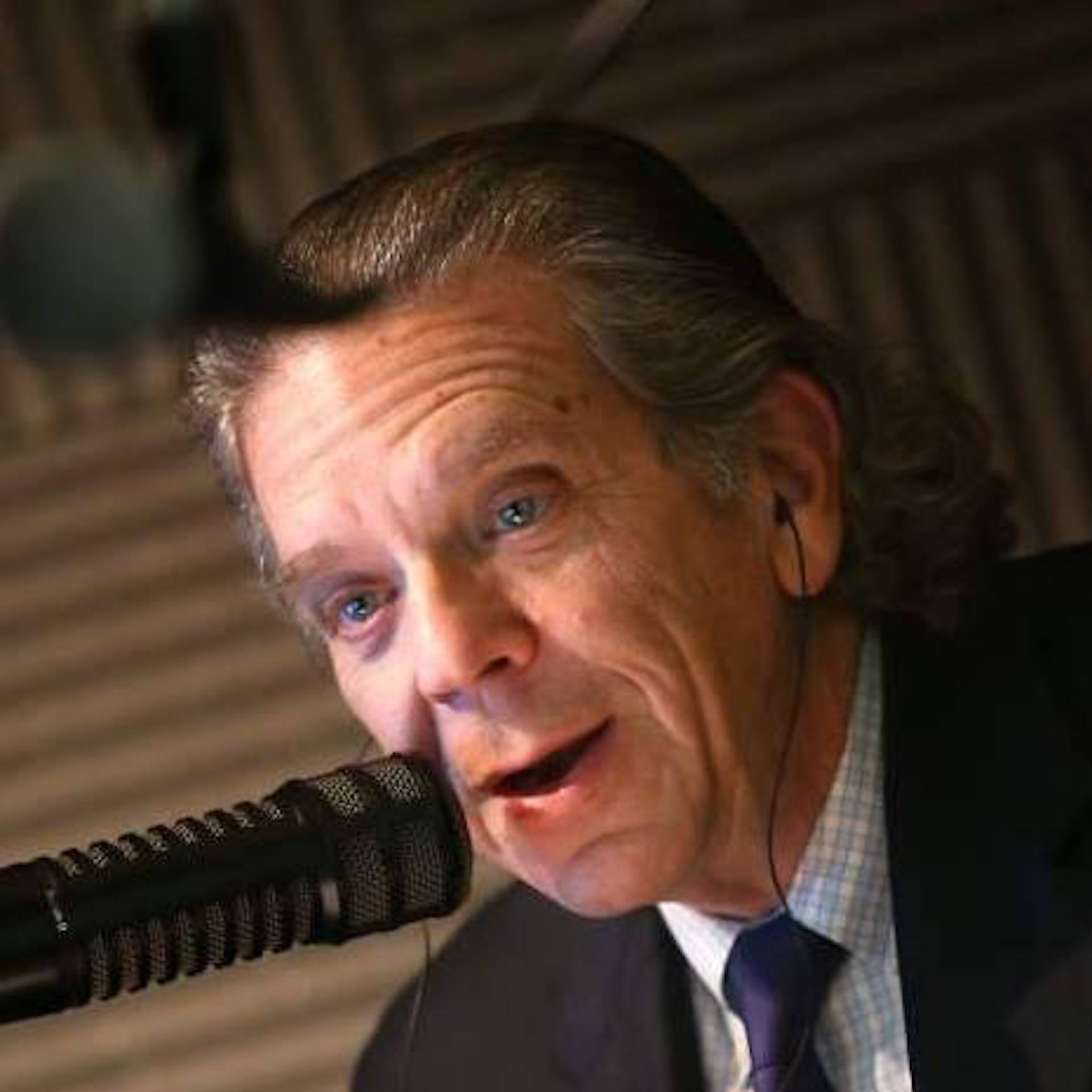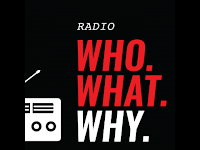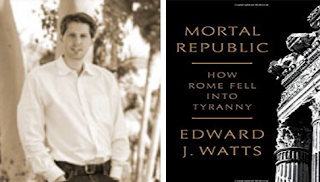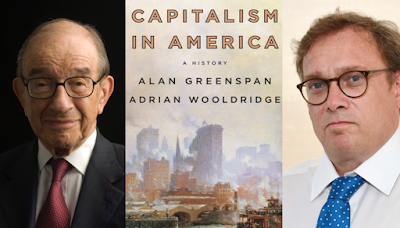Episodes
Monday Mar 25, 2019
Brave, Not Perfect
Monday Mar 25, 2019
Monday Mar 25, 2019
 A couple of years ago, Senator Elizabeth Warren made headlines with the phrase “nevertheless she persisted.” Sheryl Sandberg told women they had to “lean in.” These approaches, while certainly valuable for dealing with the symptoms of the problems that many girls and women face, ignores the core of why these actions might, in fact, be necessary.
A couple of years ago, Senator Elizabeth Warren made headlines with the phrase “nevertheless she persisted.” Sheryl Sandberg told women they had to “lean in.” These approaches, while certainly valuable for dealing with the symptoms of the problems that many girls and women face, ignores the core of why these actions might, in fact, be necessary.
Men, for the most part, don't have to make the effort to persist or to lean in, because they are socialized from the beginning to do that. To be fearless, to be disruptive, to be brave.
Reshma Saujani, a graduate of Harvard and Yale law school and former NY City public advocate, is the founder of Girls Who Code. Her organization has made remarkable inroads in bringing more girls and women into STEM and technology.
But even more than just changing the gender make up of tech, she has seen coding as a kind of metaphor for teaching women to be brave.
Her Ted talk on the subject has gotten over 4 million views and now she’s expanded on it in her new book Brave, Not Perfect: Fear Less, Fail More, and Live Bolder
My conversation with Reshma Saujani:
Thursday Mar 21, 2019
How Our Lives Are Being Run By Algorithms: From the 737 to Our Daily Commute
Thursday Mar 21, 2019
Thursday Mar 21, 2019
 When Hal asked Astronaut David Bowman to “open the pod bay doors,” it was as if our most primal fear of machines came rushing headlong into the 20th century. Today, in our 21st-century world, we understand the artificial intelligence behind HAL.
When Hal asked Astronaut David Bowman to “open the pod bay doors,” it was as if our most primal fear of machines came rushing headlong into the 20th century. Today, in our 21st-century world, we understand the artificial intelligence behind HAL.
We see on display every day our reliance on automation and AI and algorithms in flying our planes and soon our self-driving cars.
It’s the full blossoming of the promised brave new world. But is there anything we should or could do about it? Is it out of our control, or do we just need to surrender?
Joining me to talk about this is Kartik Hosangar, the author of A Human's Guide to Machine Intelligence: How Algorithms Are Shaping Our Lives and How We Can Stay in Control.
My conversation with Kartik Hosangar:
Monday Mar 11, 2019
Monday Mar 11, 2019
 When we talk about the broad swath of technology and its progenitors in Silicon Valley rarely are we talking about great breakthroughs. A new app for dating or dog walking, the one-hundredth messaging app or new forms of enterprise collaboration are hardly the stuff of Steve Jobs, or Bill Gates or Mitch Kapor or Robert Noyce or Bill Hewlett.
When we talk about the broad swath of technology and its progenitors in Silicon Valley rarely are we talking about great breakthroughs. A new app for dating or dog walking, the one-hundredth messaging app or new forms of enterprise collaboration are hardly the stuff of Steve Jobs, or Bill Gates or Mitch Kapor or Robert Noyce or Bill Hewlett.
But every once in a while there is a new new thing that really matters. Like the PC or the smartphone or Microsoft Word and Excell.
For years, many thought something called Virtual Reality might be that thing. What was not know is that it would take a 19-year-old dreamer, one of odder character in a world that celebrates oddness, to make it a reality. The fact that Mark Zuckerberg the man that the European Union just called a “technology gangster,” would co-opt it and screw it up, only adds to an important chapter of legends of Silicon Valley.
Like other legends, this one is told by Blake Harris in The History of the Future: Oculus, Facebook, and the Revolution That Swept Virtual Reality
My conversation with Blake Harris
Sunday Mar 03, 2019
How Our Republic Collapsed and How it Might Be Saved
Sunday Mar 03, 2019
Sunday Mar 03, 2019
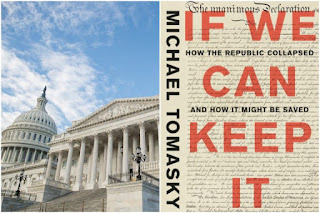 How many times a day do you hear or read someone opining on what’s wrong with America and American politics? As is too often the case we love to look for the simple solution. The one answer that will explain it all. The unified field theory of American politics.
How many times a day do you hear or read someone opining on what’s wrong with America and American politics? As is too often the case we love to look for the simple solution. The one answer that will explain it all. The unified field theory of American politics.
But unlike physics, the answer to understanding politics, the business and the interaction of people, is more nuanced, more complex and more like evolution than physics.
Layer upon layer of behavior, decisions, and leaders have lead us to where we are today. To a politics not just of polarization, but of pure primal tribalism
Longtime journalists and author Michael Tomasky tries to peel back these layer in is his new book If We Can Keep It: How the Republic Collapsed and How it Might Be Saved.
My conversation with Michael Tomasky:
Friday Mar 01, 2019
Friday Mar 01, 2019
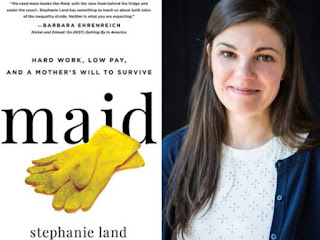 As underemployment grows and many who once seemed solidly middle-class are losing their economic foothold, the working class is getting larger and more frustrated. Both its size and perspective make the working class more important than ever before. So perhaps, more than ever, Americans across the class spectrum have good reason to try and understand working-class culture and experience.
As underemployment grows and many who once seemed solidly middle-class are losing their economic foothold, the working class is getting larger and more frustrated. Both its size and perspective make the working class more important than ever before. So perhaps, more than ever, Americans across the class spectrum have good reason to try and understand working-class culture and experience.
Millions of words have been written about the economic divide in America. An equally powerful divide is the one between those who make policy and those who live with the consequences of that policy. Even among well-meaning progressives, sometimes the consequences of their efforts are counter to their real objectives
Part of that comes from not really understanding the lives of working people in America. Perceptions of poverty and struggling come from our personal experience and often from popular culture and political rhetoric. That’s why it's so singularly unique and powerful when a voice emerges that can make us see what that world is really like. Today Stephanie Land adds her voice in Maid: Hard Work, Low Pay, and a Mother's Will to Survive.
My conversation with Stephanie Land:
Monday Feb 25, 2019
Monday Feb 25, 2019
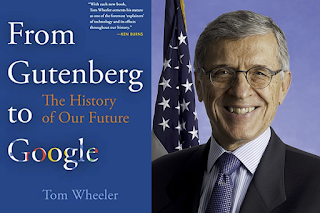 We’ve talked before about those frightening four words heard all too often. “This time it’s different.” Perhaps, besides Wall Street, nowhere else is that said as much as in Silicon Valley and the among the purveyors of every aspect of today technological and digital revolution.
We’ve talked before about those frightening four words heard all too often. “This time it’s different.” Perhaps, besides Wall Street, nowhere else is that said as much as in Silicon Valley and the among the purveyors of every aspect of today technological and digital revolution.
No question that today is different. But it also fits into a pattern of human invention that has been a part of our evolutionary biology. It’s built around our curiosity, and the need to connect and share stories and information.
In examining this, it appears that there have been several inflection points along the way. Former FCC commissioner Tom Wheeler argues in his new book, that they are Gutenberg and the invention of movable type, and the telegraph. Both of which were every bit as profound as today's insanely great products.
To take us both back and forward on this journey I’m joined by former FCC Chairman Tom Wheeler. to talk about From Gutenberg to Google: The History of Our Future.
My conversation with Tom Wheeler:
Friday Feb 22, 2019
The Future is Asian
Friday Feb 22, 2019
Friday Feb 22, 2019
 The 19th century has often been referred to as the imperial or British century. The period, after WWII was, in words coined by Henry Luce, the American Century.
The 19th century has often been referred to as the imperial or British century. The period, after WWII was, in words coined by Henry Luce, the American Century.
Today, as we move headlong into the 21st century, we are entering what Parag Khanna sees as the Asian Century.
This dramatic change is not just about China, although China is a big part of it. It’s also about the 40 other countries that make up Asia, that are connecting in a system of trade and engagement that is both ancient and modern. It’s about the greater integration of Europe and Asia,
It’s about a world and a future where history matters, even in the face of cutting edge modernity. It’s a world where politics, economics, geography, and historical context matter. Where any nation not understanding all of these factors will do so at its own peril.
How we got here is important, as is where we are. This is the subject of Parag Khanna’s new book,The Future Is Asian
My conversation with Parag Khanna:
Wednesday Feb 20, 2019
Patriarchy in the Me Too Era: A conversation with Carol Gilligan
Wednesday Feb 20, 2019
Wednesday Feb 20, 2019
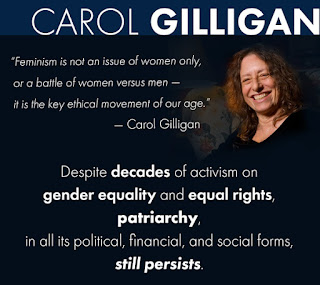 We live in an age of extremes. We talk about it every day with respect to the economic divide, the political divide, the racial divide, and the gender divide.
We live in an age of extremes. We talk about it every day with respect to the economic divide, the political divide, the racial divide, and the gender divide.
Particularly with respect to gender, how can we explain the election of the most patriarchal President ever, in an era of me too? A President whose election was supported by the majority of white women who voted.
Today, in our politics, we devote a great deal of attention to how we can address the economic divide. Think tanks and candidates pursue it endlessly. Pundits and political scientists opine daily, almost hourly, on this socio-political divide. But what is the nexus of all of this to the gender divide? How can we reconcile the seemly successful attacks on patriarchy on the one hand, and it’s powerful persistence on the other?
It's a kind of cognitive dissonance that takes a great thinker about these subjects to try and understand and address. That's what Carol Gilligan does in her new book Why Does Patriarchy Persist?
My conversation with Carol Gilligan:
Monday Feb 18, 2019
When Did We Start This "Division Thing?"
Monday Feb 18, 2019
Monday Feb 18, 2019
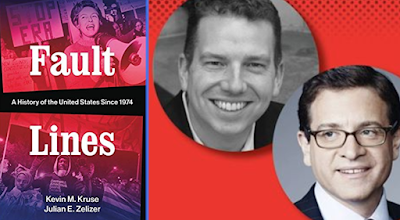 We wonder why millennials are different. Imagine growing up in our current highly partisan, polarized political environment, and not knowing anything else. Not knowing an America where compromise is possible, where division within the political parties produced candidates that moved to center. They did not watch Ronald Reagan and Tip O’Neil work across the aisle, or Lyndon Johnson exhibit political courage by championing civil rights legislation.
We wonder why millennials are different. Imagine growing up in our current highly partisan, polarized political environment, and not knowing anything else. Not knowing an America where compromise is possible, where division within the political parties produced candidates that moved to center. They did not watch Ronald Reagan and Tip O’Neil work across the aisle, or Lyndon Johnson exhibit political courage by championing civil rights legislation.
Imagine if all you knew politically was Rush, Hannity, and Maddow? For a brief and shining moment, we tried something else. Barack Obama captured it. Rather than being radical or progressive, he really was the person who we looked to make America great, to bring back the better way it used to be.
Instead, the opposite has happened.
It seems that every day we are fighting the same battles. Boomers in a kind of one last hurrah are relitigating the fights of the 60s and ’70s and things only get works, as the center cannot hold. These are the divides examined by Julian Zelizer and Kevin Kruse in Fault Lines: A History of the United States Since 1974
My conversation with Julian Zelizer & Kevin Kruse:
Friday Feb 15, 2019
What If The Solution to Fix Democracy is Actually Less Democracy
Friday Feb 15, 2019
Friday Feb 15, 2019
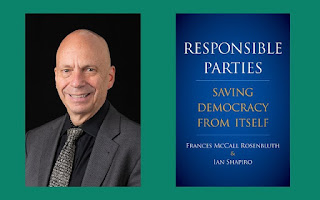 According to a report just released by Freedom House, a watchdog group that advocates for democracy, political rights, and civil liberties became weaker in 68 countries. The report also says the U.S. freedom score has declined by 8 points (from 94 to 86) over the past eight years.
According to a report just released by Freedom House, a watchdog group that advocates for democracy, political rights, and civil liberties became weaker in 68 countries. The report also says the U.S. freedom score has declined by 8 points (from 94 to 86) over the past eight years.
At the same time we know that voters are unhappy, We are told that democracy is collapsing, that fascism is on the rise. We hear particularly from the left about the need for more direct democracy. For greater citizen participation, for more direct referendum and initiatives. One group, on this program recently called for citizen assemblies that would supplant representative government.
Yet it seems the more of this do it yourself politics we have, the more anger there is, the more divided we are.
What if we are going in the wrong direction? What if the answer to democracy’s problems is not more democracy, but more appreciation for the system of parties and representative government that our founders passed down to us.
It seems today that this is a very contrarian view. Perhaps that’s why it just might be correct. It’s put forth by Yale Professor Ian Shapiro in Responsible Parties: Saving Democracy from Itself
My conversation with Ian Shapiro:
Thursday Feb 07, 2019
Why We Need Special Prosecutors....It's Not For Harassment
Thursday Feb 07, 2019
Thursday Feb 07, 2019
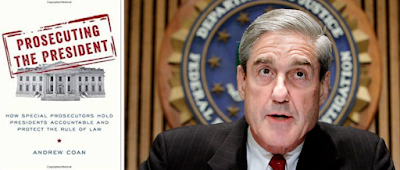 Ken Starr, Archibald Cox, Leon Jaworski, Lawrence Walsh, and Robert Mueller. These names are almost as familiar as the Presidents they investigated. What does that say about the role of Special Prosecutors, the power the have, the evolution of their role in history and how we should see them today?
Ken Starr, Archibald Cox, Leon Jaworski, Lawrence Walsh, and Robert Mueller. These names are almost as familiar as the Presidents they investigated. What does that say about the role of Special Prosecutors, the power the have, the evolution of their role in history and how we should see them today?
When a lesser know name, John Henderson was the special prosecutor pursuing Ulysses S. Grant in 1875 we didn’t have a 24/7 new cycle, and hundreds of former US Attorneys, commenting on his every move.
So once again, the question has to be asked, does this important safeguard of democracy even work in our current political, media and partisan environment.
Of course the best way to know is to examine the history. That what Andrew Coan does in Prosecuting the President: How Special Prosecutors Hold Presidents Accountable and Protect the Rule of Law
My conversation with Andrew Coan:
Monday Feb 04, 2019
Monday Feb 04, 2019
 In an era in which everything it politicized, from the TV shows and the movies we watch to the places we shop, it’s not surprising that architecture and design would also be reflective of the politics of the day. This phenomenon is nothing new.
In an era in which everything it politicized, from the TV shows and the movies we watch to the places we shop, it’s not surprising that architecture and design would also be reflective of the politics of the day. This phenomenon is nothing new.
For proof of this, we need to look no further than Philip Johnson. Considered one of the greatest of modern architects, he would spend a good part of his life caught in the vortex between his politics and his art. His art, on the one hand, reflecting who he really was (because art seldom lies,) but also using the scope and causes of that work, to try and escape from who he was and what he believed.
That dilemma lies at the heart of an insightful new biography of Johnson by Mark Lamster, the architecture critic of the Dallas Morning News, a professor in the architecture school at the University of Texas at Arlington, a 2017 Loeb Fellow of the Harvard Graduate School of Design, and the author of The Man in the Glass House: Philip Johnson, Architect of the Modern Century.
My conversation with Mark Lamster:
Wednesday Jan 30, 2019
Is This The End of Shopping?
Wednesday Jan 30, 2019
Wednesday Jan 30, 2019
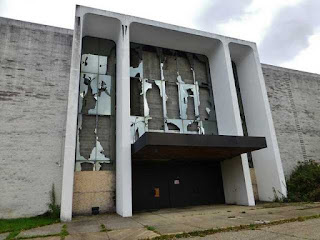 All over the world, as populism surges, as creative destruction makes economic change inevitable, the focus on manufacturing and manufacturing jobs is often front and center. Maybe it’s the old romantic of a nation of big shoulders; the factories and machines spinning noisily, providing well-paying jobs.
All over the world, as populism surges, as creative destruction makes economic change inevitable, the focus on manufacturing and manufacturing jobs is often front and center. Maybe it’s the old romantic of a nation of big shoulders; the factories and machines spinning noisily, providing well-paying jobs.
But the fact is that far more jobs, almost 30 million, exist in the retail sector in the US, and those jobs are in far greater jeopardy than anything in manufacturing.
We see it all around us on empty main streets and in malls. It’s easy and somewhat lazy to blame it all on Amazon, and the internet. The causes go far deeper. Our entire relationship to shopping, to the acquisition of things, and to brands is changing. And millennials are leading the way.
As both millennials and aging, empty nest boomers move to cities, there simply isn't as much space to store all the stuff that we used to buy. Why else has Marie Kondo become an international icon?
So if retail is to survive, a lot has to change according to Mark Pilkington in his book Retail Therapy: Why the Retail Industry is Broken – and What Can Be Done to Fix It.
My conversation with Mark Pilkington:
Tuesday Jan 29, 2019
Black Feminist Politics
Tuesday Jan 29, 2019
Tuesday Jan 29, 2019
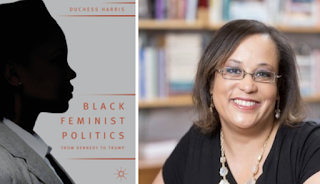 The Blue Wave of the recent election would not have been possible without black women voters. The election of Doug Jones in Alabama would not have been possible without the turnout of black women.
The Blue Wave of the recent election would not have been possible without black women voters. The election of Doug Jones in Alabama would not have been possible without the turnout of black women.
The recent focus on Stacy Abrams, Kamala Harris, Maxine Waters, Oprah, and even Michelle Obama speak to the fact that Democratic and progressive politics today, as well as our cultural politics, is being defined and even redefined by black feminist politics.
When we look back at the history of black women and racial progress, women like Ida B. Wells, Fanny Lou Hammer, and even Rosa Parks, all of this should be no surprise. Today, coupled with the Me Too movement and the resistance to Trump, this has the makings a lasting, permanent and far-reaching a change in our politics.
Few understand this better, both historically and contemporaneously than Professor Duchess Harris, the author of Black Feminist Politics from Kennedy to Trump.
My WhoWhatWhy conversation with Duchess Harris:
Monday Jan 21, 2019
The Wives of the Vietnam Era: What We Learned and What's Different Today
Monday Jan 21, 2019
Monday Jan 21, 2019
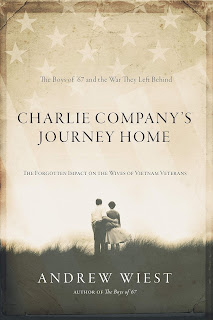 The poet John Milton writing in the 17th century got it right when he said that “They also serve who only stand and wait.” No better description could be written to capture the essence of military families.
The poet John Milton writing in the 17th century got it right when he said that “They also serve who only stand and wait.” No better description could be written to capture the essence of military families.
Today, as a nation, we have acknowledged that service. We have some, but still not enough understanding and services for those waiting at home. But back during the Vietnam war, when those serving did not represent a true cross-section of America, when the opportunities, especially for the wives back home were very limited, the price our soldiers, and we as a nation paid for that was high.
As we struggle to serve the soldiers and veterans of today's Iraq and Afghanistan era, it’s a history we best heed. A history captured eloquently and powerfully by Andrew Wiest in Charlie Company's Journey Home: The Forgotten Impact on the Wives of Vietnam Veterans.
My conversation with Andrew Wiest:
Thursday Jan 17, 2019
Housing, Housing, Housing
Thursday Jan 17, 2019
Thursday Jan 17, 2019
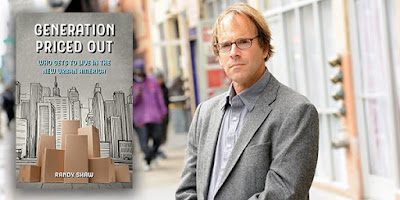 Over the past two decades, we’ve seen a modern great migration as more and more Americans move from suburban and rural America to cities. This trend cuts across all demographic groups but has been especially true for millennials and aging boomers.
Over the past two decades, we’ve seen a modern great migration as more and more Americans move from suburban and rural America to cities. This trend cuts across all demographic groups but has been especially true for millennials and aging boomers.
As a result, our great cities have experienced skyrocketing rents, displacement of the poor, gentrification and protracted conflict between NIMBY homeowners, landlords, and renters
What was once a local debate has become a national story. How it plays out, is a kind of petri dish of our collectives values and how we see our communities in this first quarter of the 21st century.
Randy Shaw, a longtime housing activist in San Francisco, has lived these issues. Now he delivers a broad view in Generation Priced Out: Who Gets to Live in the New Urban America.
My conversation with Randy Shaw:
Tuesday Jan 15, 2019
Tuesday Jan 15, 2019
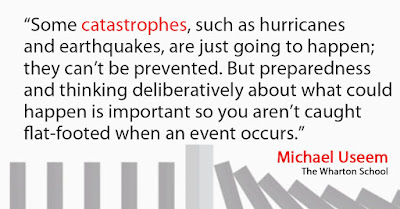 Every day we talk about disruption as if it's mostly positive within the business and consumer environment. But for companies today, both large and small, an array of challenges and potentially disruptive events can have a real negative impact on the company, its earnings, its employees and its customers.
Every day we talk about disruption as if it's mostly positive within the business and consumer environment. But for companies today, both large and small, an array of challenges and potentially disruptive events can have a real negative impact on the company, its earnings, its employees and its customers.
Corporate executives today realize that the degree to which they can anticipate and prepare for that disruption will have a deep impact on how it all turns out on the other end. What's more, many of the approaches and techniques that today's companies can and should adhere to just might be applicable to the chaotic lives of all of us.
Studying this for years is Wharton professor Howard Kunreuther. He's the James G Dinan Professor of Decision Science and Public Policy and co-director of the Center for Risk Management and Decision Processes at the Wharton School at the University of Pennsylvania, and he’s the co-author of Mastering Catastrophic Risk: How Companies Are Coping with Disruption.
My conversation with Howard Kunreuther:
Wednesday Jan 09, 2019
The Pentagon's $21 Trillion Con Game
Wednesday Jan 09, 2019
Wednesday Jan 09, 2019
 Some of you may recall a few weeks ago, newly elected Congresswoman Alexandria Ocasio-Cortez made a splash, talking about $21 trillion in misappropriated Pentagon money, which she claimed was enough to take care of Medicare for all. She based her conclusions on the misreading of an article in the Nation by investigative reporter, Dave Lindorff.
Some of you may recall a few weeks ago, newly elected Congresswoman Alexandria Ocasio-Cortez made a splash, talking about $21 trillion in misappropriated Pentagon money, which she claimed was enough to take care of Medicare for all. She based her conclusions on the misreading of an article in the Nation by investigative reporter, Dave Lindorff.
It’s too bad, because her misreading took the focus away from what the story did say about the Defense Department’s shady and possibly unconstitutional budgeting practices and the massive amount of fraud that has now been uncovered. What the story did detail is how the Pentagon badly failed its audit that it has resisted for decades, and that $21 trillion of financial transactions on both sides of the ledger between 1998 and 2015 could not be accounted for. This is the story that award-winning investigative reporter Dave Lindorff writes in"The Pentagon's Massive Accounting Fraud Exposed," in a recent issue of The Nation.
My WhoWhatWhy.org conversation with Dave Lindorff:
Saturday Jan 05, 2019
San Francisco, Silicon Valley and the Future of Cities
Saturday Jan 05, 2019
Saturday Jan 05, 2019
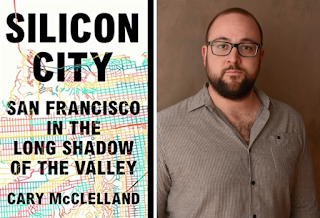 Social, cultural and technological change is all around us. We live in an era of upheaval, not unlike the movement from an agrarian to a manufacturing economy that took place 100+ years ago. At the time, many thought it was, to borrow a phrase, the end of history. Many spoke about the evils of cities. They thought that leaving the farm was anti-American, that it went against the Jeffersonian ideal of America.
Social, cultural and technological change is all around us. We live in an era of upheaval, not unlike the movement from an agrarian to a manufacturing economy that took place 100+ years ago. At the time, many thought it was, to borrow a phrase, the end of history. Many spoke about the evils of cities. They thought that leaving the farm was anti-American, that it went against the Jeffersonian ideal of America.
It produced anger, sometimes violence, labor strife, and in the end a whole new economy that some long for today. The current shift that is far from done. As AI, crypto, virtual reality and whole new ways of looking at the world change the landscape of just about everything.
Arguably ground zero for this remarkable change is San Francisco and the Silicon Valley. Ground zero in a time of monumental change is never an easy or safe place to be. And certainly, it is having its impact on a City that once saw itself first as a bastion of manners and old wealth and then as the center of progressive cultural revolution. Today, it’s the center of another kind of inevitable and inexorable revolution that Cary McClelland details in Silicon City: San Francisco in the Long Shadow of the Valley.
My conversation with Cary McClelland:
Monday Dec 31, 2018
We All Have A Role To Play In the Biggest Story of 2019
Monday Dec 31, 2018
Monday Dec 31, 2018
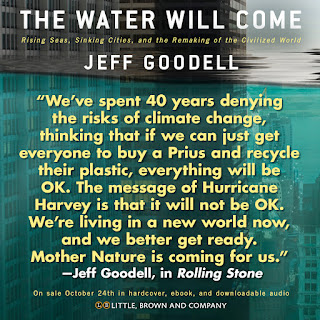 We think that politics might actually change the world for better or for worse. It probably won't. It's certainly more likely that climate change, weather, and rising sea levels will have a far more profound impact. The recent UN report on climate indicated that we could be facing existential risks within 20 years. So what is the world to do?
We think that politics might actually change the world for better or for worse. It probably won't. It's certainly more likely that climate change, weather, and rising sea levels will have a far more profound impact. The recent UN report on climate indicated that we could be facing existential risks within 20 years. So what is the world to do?
Jeff Goodell, a contributing editor at Rolling Stone, takes us deep into not the debate but the story of the particle reality in The Water Will Come: Rising Seas, Sinking Cities, and the Remaking of the Civilized World
My conversation with Jeff Goodell:
Wednesday Dec 26, 2018
With Each New Year, Do We Loose A Little of What Makes Us Human?
Wednesday Dec 26, 2018
Wednesday Dec 26, 2018
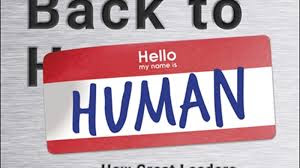 How much of your work day is about emails, texts, Slack, Basecamp or Shift? And how much is about phone calls or meetings or basic human contact? If you’re like most people today, a large portion is devoted to apps, to screens, and to technology. And less and less to human contact.
How much of your work day is about emails, texts, Slack, Basecamp or Shift? And how much is about phone calls or meetings or basic human contact? If you’re like most people today, a large portion is devoted to apps, to screens, and to technology. And less and less to human contact.
How many times have you sent a work text or email to someone yards or even feet away? How many Holiday texts or emails did you send, rather than make a phone call, or a date for coffee? All of this comes with a price. It disconnects us over and over again so that we begin to lose the basic skills of human contact and interaction.
According to Dan Schawbel, the price we pay is not just in the workplace but in the very act of being human. Schawbel writes about this in Back to Human: How Great Leaders Create Connection in the Age of Isolation.
My conversation with Dan Schawbel:
Wednesday Dec 19, 2018
The Business of Punishment
Wednesday Dec 19, 2018
Wednesday Dec 19, 2018
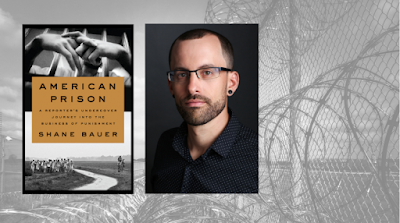 The U.S. imprisons a higher portion of its population than any country in the world. The so-called “prison industrial complex” is, for many towns in rural America, a driving force for its economy. At the same time, many of these prisons have been turned over to private companies, like Prison Corporation of America, to be run as cheaply and profitably as possible, regardless of the damage inflicted on inmates.
The U.S. imprisons a higher portion of its population than any country in the world. The so-called “prison industrial complex” is, for many towns in rural America, a driving force for its economy. At the same time, many of these prisons have been turned over to private companies, like Prison Corporation of America, to be run as cheaply and profitably as possible, regardless of the damage inflicted on inmates.
The result, in fact, the necessity, is the dehumanization of prisoners and subsequently the gradual dehumanization of those that work in these places.
Shane Bauer, a senior reporter for Mother Jones, went inside, as a $9 an hour guard, to see first hand what was happening inside the Winnfield, Louisiana prison. His magazine story gained national attention and has now become a new book American Prison: A Reporter's Undercover Journey into the Business of Punishment
Thursday Dec 13, 2018
Is it Possible to Believe in Nationalism and Think Globally at the Same Time?
Thursday Dec 13, 2018
Thursday Dec 13, 2018
 It seems that every day, as Trump makes another seemingly horrible comment, we ask ourselves how did this happen? Millions of words have been spilled trying to answer that question. Fascism, bigotry, populism, social and cultural issues, have all been trotted out. But first and foremost is the jingoistic nationalism that seems to be rampant among Trump's base, as it is around the world. As dislocation, change, and creative destruction continues, people seek solace in their most fundamental national tribe.
It seems that every day, as Trump makes another seemingly horrible comment, we ask ourselves how did this happen? Millions of words have been spilled trying to answer that question. Fascism, bigotry, populism, social and cultural issues, have all been trotted out. But first and foremost is the jingoistic nationalism that seems to be rampant among Trump's base, as it is around the world. As dislocation, change, and creative destruction continues, people seek solace in their most fundamental national tribe.
But is the left making a mistake by rejecting nationalism out of hand, or is there a place for nationalism and national identity even as one believes in immigration, open borders, free trade, and globalization? That the questions that John Judis takes on in The Nationalist Revival: Trade, Immigration, and the Revolt Against Globalization
My conversation with John Judis:
Tuesday Dec 11, 2018
Tuesday Dec 11, 2018
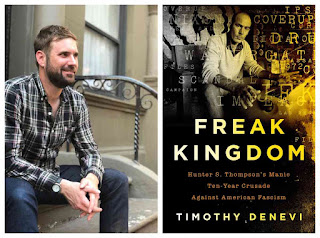 At a time when journalism is under siege when the attacks sometimes result in too much caution when the goal of politicians is to attack journalist like they are working the refs, it’s worth thinking about times when we’ve seen full-throated, muscular and sometimes participatory journalism. The kind practiced by the likes of Jimmy Breslin, or H.L. Menken, George Plimpton, Truman Capote, Norman Mailer or Hunter S. Thompson.
At a time when journalism is under siege when the attacks sometimes result in too much caution when the goal of politicians is to attack journalist like they are working the refs, it’s worth thinking about times when we’ve seen full-throated, muscular and sometimes participatory journalism. The kind practiced by the likes of Jimmy Breslin, or H.L. Menken, George Plimpton, Truman Capote, Norman Mailer or Hunter S. Thompson.
Thompson had the opportunity to be present for many world-changing moments. How he saw them, and how he reported them, may have shaped a generation of readers and it may still be in the very DNA of how we consume news today.
Timothy Denevi captures the zeitgeist of the Thompson moment in Freak Kingdom: Hunter S. Thompson's Manic Ten-Year Crusade Against American Fascism
My conversation with Tim Denevi:
Wednesday Dec 05, 2018
Bribery, Kickbacks and Corruption: Why It Matters
Wednesday Dec 05, 2018
Wednesday Dec 05, 2018
 When we hear the phrase follow the money, we’ve come to understand that it usually leads back to nefarious political activities, self-dealing and corrupt public servants or worse. But sometimes that money trail leads to something that’s become so commonplace we hardly notice it anymore. The business of corporate bribery, and kickbacks around the world
When we hear the phrase follow the money, we’ve come to understand that it usually leads back to nefarious political activities, self-dealing and corrupt public servants or worse. But sometimes that money trail leads to something that’s become so commonplace we hardly notice it anymore. The business of corporate bribery, and kickbacks around the world
As the global economy becomes ever more interconnected, as the membrane between governments and transnational corporations become ever thinner, this kickbacks and bribes have a multiplier effect that often leads directly to conflict, repression, and violence around the globe.
Like the butterfly flapping its wings in Main, the impact can be felt in the caves of Afghanistan, or the boardrooms of China, or the corridors of power on Capitol Hill.
David Montero cuts to the quick of this in Kickback: Exposing the Global Corporate Bribery Network.
My conversation with David Montero:
Monday Dec 03, 2018
Democracies Are Not Forever...Are We Headed Down the Same Path As Rome?
Monday Dec 03, 2018
Monday Dec 03, 2018
Each day more of our national political and governmental norms fall away. Our national leadership is at best in a moral vacuum, at worst, a corrosive force, an autoimmune disease eating the very fabric of the nation.
The violence of the past months reminds us that it does no good to hold the Pollyannaish belief that everything will all be all right, that we’ve been through this before and that the democratic institutions that Madison and the founders designed, and that moral framework upon which it was built, can withstand what we face today.
We like to think, based on past crisis, that our systems are strong enduring, resilient. Maybe. But there is no guarantee that it will last forever. After all, the Roman Republic lasted for 500 years and then collapsed. It Collapsed for many reasons similar to the issues and choices we face today. Historian and Professor Edward Watts, in his new book Mortal Republic: How Rome Fell into Tyranny shines a light on the path we are headed down.
My conversation with Edward Watts:
Saturday Nov 24, 2018
Saturday Nov 24, 2018
 For those that study and write about politics, the holy grail is to find those seminal moments in the nation's public and political life that change everything. And while the antecedents of those events may be years in the making, they usually create a perfect storm that results in an event that is a kind of tipping point; one that marks a permanent tectonic shift in the political landscape. Sometimes we have to let time pass, before we appreciate or even understand those moments.
For those that study and write about politics, the holy grail is to find those seminal moments in the nation's public and political life that change everything. And while the antecedents of those events may be years in the making, they usually create a perfect storm that results in an event that is a kind of tipping point; one that marks a permanent tectonic shift in the political landscape. Sometimes we have to let time pass, before we appreciate or even understand those moments.
The televised Nixon-Kennedy Debate, Watergate, the Nixon’s resignation and the Vietnam war piped into our living rooms, are such event. And, according to longtime political journalist Matt Bai, the implosion of Gary Heart's presidential campaign in 1987, was also such a moment. One that Bai captures in all its complexity, in All the Truth Is Out: The Week Politics Went Tabloid. The book has been turned into the recently released movie THE FRONT RUNNER, also co-written by Bai.
It's about a time when politics became a plot-line, when the personal became both political and public, and when Who, What, Where and When, became Gotcha. This conversation, while it originally took place in 2014, shows the blueprint of how Trump got elected and how we got to where we are today.
My conversation with Matt Bai:
Tuesday Nov 20, 2018
California is Burning - Here's Why
Tuesday Nov 20, 2018
Tuesday Nov 20, 2018
 For those of you that are old enough, you may remember that one of the crazy ideas that came out of counterinsurgency during the Vietnam War was that we often had to destroy a village in order to save it. It was counterintuitive and maybe it was right or wrong, but it went to the heart of the broader argument that we see playing out over and over again in so many areas. In order to do better and really focus on long-term good, we have to go beyond the immediate emotional reactions and see the bigger picture.
For those of you that are old enough, you may remember that one of the crazy ideas that came out of counterinsurgency during the Vietnam War was that we often had to destroy a village in order to save it. It was counterintuitive and maybe it was right or wrong, but it went to the heart of the broader argument that we see playing out over and over again in so many areas. In order to do better and really focus on long-term good, we have to go beyond the immediate emotional reactions and see the bigger picture.
Such is the case with California’s forests. Many are overgrown, populated with millions of dead trees, and the state has neither the resources nor the manpower to deal with this. More complicating is the relationship with California’s largest landowner, the federal government, and the interface with private property. Today, the cost in terms of life, property, and environmental damage is staggering.
Julie Cart, a long-time environmental reporter in California and a writer for CALmatters, has written extensively about the horrors California now faces, seemingly on an annual basis.
My WhoWhatWhy.org conversation with Julie Cart:
Tuesday Nov 20, 2018
Jamal Khashoggi's Secret Interview
Tuesday Nov 20, 2018
Tuesday Nov 20, 2018
 The world of journalism faces an existential crisis . Attacks on the press as "the enemy of the people" by the president of the United States and other authoritarian leaders is just the beginning. Bombs sent to CNN, reporters spat on at political rallies, and the murder of Washington Post columnist Jamal Khashoggi make the prima facie case.
The world of journalism faces an existential crisis . Attacks on the press as "the enemy of the people" by the president of the United States and other authoritarian leaders is just the beginning. Bombs sent to CNN, reporters spat on at political rallies, and the murder of Washington Post columnist Jamal Khashoggi make the prima facie case.
Award-winning international journalist and foreign policy analyst Rula Jebreal, comes to this discussion with a unique perspective. Having covered stories and worked in Italy, the US, and the Middle East, she sees the global dimensions of the issues. Perhaps most significantly, she secretly conducted one of the last interviews with Jamal Khashoggi. In that interview Khashoggi talks about what it might take for the US to actually look objectively at Saudi Arabia. But this would only happen, he believed, in the face of a serious crisis. Little did he know that his brutal murder would be that crisis.
My WhoWhatWhy.org interview with Rula Jebreal.
Wednesday Nov 14, 2018
Why Capitalism Matters and Why We Need to Protect It
Wednesday Nov 14, 2018
Wednesday Nov 14, 2018
Bill Clinton got it almost right when he said, “it’s the economy stupid.” But it’s more than that. It might be more accurate to say, it's capitalism, stupid. The system that took thirteen disparate colonies, and in 400 years became the greatest economic engine on the planet.
How this happened, why it happened, is not an accident. But the results of some very specific events, decisions, and attitudes. Equality true is that if we are not careful, it may not be forever
In today's world, we either keep up, or we don't. Just as we stole our model from Great Britain, others are closing in on us. Today we have 5% of the world's population, 20% of the world's patents and 25% of the world economy. Going forward that may not always be the case.
To the extent that what is past is prologue, it’s worth taking a look at the history of capitalism in America, to see if we can indeed keep it going. Taking us on this historical journey is Economist journalist and columnist Adrian Wooldridge, the co-author, with Alan Greenspan, of Capitalism in America: A History.
My conversation with Adrian Wooldridge:
Monday Nov 12, 2018
History in Plain Sight: WWI and the Unknown Soldiers
Monday Nov 12, 2018
Monday Nov 12, 2018
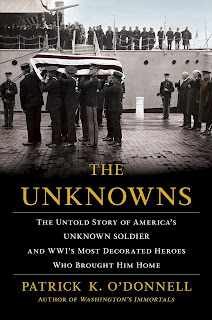 Someone wrote a national column last year suggesting that whoever we elect to office should at the very least be able to pass a basic high school test in American history. The fact is, we all should be able to. If only because the past is prologue. Because where we are as a nation today, and the problems and privileges we embrace is a direct result of all that history.
Someone wrote a national column last year suggesting that whoever we elect to office should at the very least be able to pass a basic high school test in American history. The fact is, we all should be able to. If only because the past is prologue. Because where we are as a nation today, and the problems and privileges we embrace is a direct result of all that history.
Few have done more to help us understand our military history than Patrick O'Donnell.
In his latest book, The Unknowns: The Untold Story of America’s Unknown Soldier and WWI’s Most Decorated Heroes Who Brought Him Home, Patrick takes us back 100 years to a story that, while unique to itself, represents the fundamental reverence we should have as a nation for those that gave their last full measure of devotion.
Wednesday Nov 07, 2018
Notes On Hope from Anne Lamott
Wednesday Nov 07, 2018
Wednesday Nov 07, 2018
 In looking at the world today, not just at our politics, but at our social and moral climate, it’s easy to conclude that there is no hope. Things fall apart, the center does not hold and it does seem in as if, in Yates’ words, “mere anarchy is loosed upon the world.”
In looking at the world today, not just at our politics, but at our social and moral climate, it’s easy to conclude that there is no hope. Things fall apart, the center does not hold and it does seem in as if, in Yates’ words, “mere anarchy is loosed upon the world.”
So what do we have to be hopeful about? The answer it seems lies deep within each of us, and not from some outside force. While we are feeling doomed and overwhelmed, Anne Lamott reminds us, that almost everything will work out “if you just unplug it for a few minutes.”
In her new work, Almost Everything: Notes on Hope, she lays out some guideposts, some touchstones to hold on to in the midst of personal turmoil and global chaos.
My conversation with Anne Lamott:
Tuesday Nov 06, 2018
Greg Sargent looks at Thunderdome Politics in the Age of Trump
Tuesday Nov 06, 2018
Tuesday Nov 06, 2018
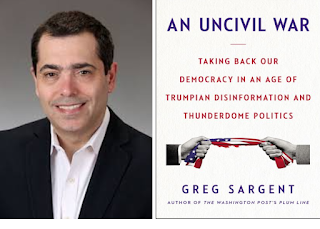 Just how fragile or resilient are our democratic institutions? For two years we’ve heard that the fundamental institutions, like the courts, the rule of law, and the so-called grown-ups and the permanent govt. would provide guardrails against the worst authoritarian impulses of this presidency.
Just how fragile or resilient are our democratic institutions? For two years we’ve heard that the fundamental institutions, like the courts, the rule of law, and the so-called grown-ups and the permanent govt. would provide guardrails against the worst authoritarian impulses of this presidency.
We are told that we’ve been through bad times before. It may be, however, that, in the often scary words of wall street, “this time it's different.” What we face now is less about ideology than about the exercise of raw power. Fed by fear of change and appealing to white nationalism, hate, and racism. All in an environment that is hyper-pressurized, piped in 24/7 and brilliantly fueled by the lowest appeals to human behavior. In that way, maybe this time is different.
Trying to pull all these strings together is Washington Post Plum Line columnist Greg Sargent, in his new book An Uncivil War: Taking Back Our Democracy in an Age of Trumpian Disinformation and Thunderdome Politics
My conversation with Greg Sargent:
Saturday Nov 03, 2018
The Forgotten and The Angry: A Search for the Trump Voter
Saturday Nov 03, 2018
Saturday Nov 03, 2018
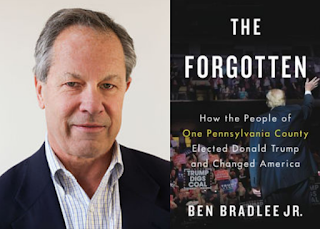 Every day, as a new Trump embarrassment emerges from the White House, people ask, how did this happen?
Every day, as a new Trump embarrassment emerges from the White House, people ask, how did this happen?
Millions of words have now been written about the current state of our politics, our country and of our civic discourse. About the anger that abounds. Every publication, every cable channels, every journalist who covers politics, and many that don’t, have opined on how we got here.
There are as many theories as there are journalists, pundits, professors, and consultants. How did eight million voters who voted for Obama twice become Trump vote
How did the political class miss what was going on among the group that Hillary Clinton called a “basket of deplorables,” while Obama talked of how “they cling to guns or religion or antipathy toward people who aren't like them.”
Ben Bradlee Jr. went looking for answers and looking for America in Luzerne County Pennsylvania. What he found was both sobering and frightening and proof positive of two Americas. He reports it all in The Forgotten: How the People of One Pennsylvania County Elected Donald Trump and Changed America.
My conversation with Ben Bradlee, Jr.:
Friday Nov 02, 2018
Reagan Would Be Such An Improvement Today
Friday Nov 02, 2018
Friday Nov 02, 2018
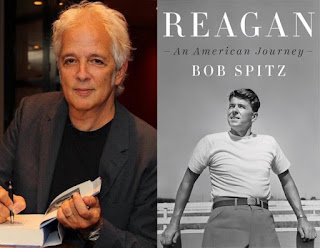 Someone said recently that Donald Trump may not be our worst President ever, the jury is still out. But for sure, he is the worst person ever to be President.
Someone said recently that Donald Trump may not be our worst President ever, the jury is still out. But for sure, he is the worst person ever to be President.
The point is that character, personal legacy, personal relationships and upbringing do matter. We place our trust as a people and has a nation in the sum total of the lives of the people we elect to lead us. Personal traits and politics are often separate, but equal. Over the past 240 years, we did a pretty decent job of combining the two. One such example was Ronald Reagan. Whether we agreed with him politically or not, he brought with him personal qualities that we long for today. Personal qualities that in so many ways shaped his politics and his policy and created his legacy.
Biographer Bob Spitz takes a look at this in Reagan: An American Journey
My conversation with Bob Spitz:
Thursday Nov 01, 2018
Democracy, Rebellion and Revolution: Pick Two
Thursday Nov 01, 2018
Thursday Nov 01, 2018
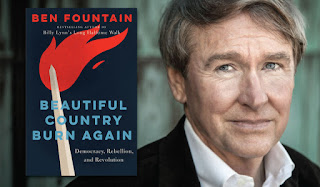 Alan Greenspan has argued that the essence of American capitalism is creative destruction. That our tolerance for change, for the new, for being willing to replace incumbents, even when painful, is the essence of what has moved the US to become, in a mere 400 years, the most powerful economic engine on the planet.
Alan Greenspan has argued that the essence of American capitalism is creative destruction. That our tolerance for change, for the new, for being willing to replace incumbents, even when painful, is the essence of what has moved the US to become, in a mere 400 years, the most powerful economic engine on the planet.
However, With respect to our governance, we have not been as tolerant or as flexible. We have clung to ideas and systems that have changed only under the most dire circumstances. The civil war changed us, but not entirely...The great depression changed us, but again, not entirely...just listen to Mitch McConnell last week looking to shred the social safety net.
As for the present, Donald Trump did not deliver all the problems we face today. He merely exploited them….just as demagogues often do.
And so as we once again face a huge disconnect between the reality of the world...a world of global integration, social and economic dislocation and division, siloed and self-reinforcing news and information, and a governmental system unattuned and unresponsive. All of this can’t help but leaveBen Fountain has examined this world from the first volleys of the 2016 election, right up until today. His observations are in his new work Beautiful Country Burn Again: Democracy, Rebellion, and Revolution
whole groups of people behind. Author and journalist
My conversation with Ben Fountain:
Monday Oct 29, 2018
Men on the Sidelines of American Life
Monday Oct 29, 2018
Monday Oct 29, 2018
 It is almost axiomatic to say that so many of the problems that plague men in our society today stem from changes in economics. That technology, globalization, education or lack thereof, are all at the core of the problem. Yet, regardless of who we give credit or blame too, unemployment is at the lowest it’s been in 50 years. American manufacturing is relatively strong.
It is almost axiomatic to say that so many of the problems that plague men in our society today stem from changes in economics. That technology, globalization, education or lack thereof, are all at the core of the problem. Yet, regardless of who we give credit or blame too, unemployment is at the lowest it’s been in 50 years. American manufacturing is relatively strong.
Sure things have changed with respect to jobs and the economy, but clearly, other forces are at play for men. The result is not just the “me too” movement, but a redefinition of the very idea of masculinity
Often times, pop culture gives us insight into the human condition. As we watch the rise, fall, and transformation of Don Draper, and Tony Soprano trying to get in touch with his feelings, perhaps we saw precursors of what’s happening in America today.
The problem is that the cost for the country and for our communities is high. Andrew L. Yarrow, a senior fellow at the Progressive Policy Institute, has been a New York Times reporter, a Labor Department speechwriter, and a U.S. history professor at American University, and is the author of Man Out: Men on the Sidelines of American Life.
My conversation with Andrew Yarrow:
Monday Oct 29, 2018
When They Take Away Your Vote, Who Ya Gonna Call?
Monday Oct 29, 2018
Monday Oct 29, 2018
 For several years now, we’ve been inundated with fake news about alleged voter fraud. Fraud that simply does not exist anywhere in the country. However, these stories have been used as the basis and justification of voter suppression efforts in several states today. Efforts that may directly and adversely impact the outcome of some close races. These efforts take several forms — untenable voter ID laws, exact match, purging voters from the registration rolls, and many more tactics, all very specifically directed at suppressing the votes of African Americans and minority voters.
For several years now, we’ve been inundated with fake news about alleged voter fraud. Fraud that simply does not exist anywhere in the country. However, these stories have been used as the basis and justification of voter suppression efforts in several states today. Efforts that may directly and adversely impact the outcome of some close races. These efforts take several forms — untenable voter ID laws, exact match, purging voters from the registration rolls, and many more tactics, all very specifically directed at suppressing the votes of African Americans and minority voters.
There was a time when the federal government, in the form of the Department of Justice, would step in and try to right these wrongs. Not so today. As a result, we have to rely on independent legal groups and organizations of journalists like WhoWhatWhy to take up the challenge of these efforts, absorb the cost, and know how to redress the appropriate courts. Much of this legal work of late has been taken up by the Lawyers’ Committee for Civil Rights Under Law, and we’re going to spend some time today talking to my guest Ezra Rosenberg, who is the co-director of the organization’s Voting Rights Project.
Ezra Rosenberg has been consistently ranked among one of the top litigators in the country. He’s been involved aggressively in pro bono representation, was one of the lead counsels challenging Texas’s photo ID laws, and was named to the National Law Journal’s Pro Bono Hit List for his role in significant public interest cases of national importance.
Tuesday Oct 23, 2018
The Last Time "Nationalism" Was Embraced...Hitler and his American Friends
Tuesday Oct 23, 2018
Tuesday Oct 23, 2018
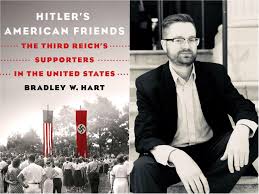 Last night in Houston Trump declared himself a “nationalist, “with all the baggage that the label implies. That phrase, along with things like “America First,” almost instantly bring us back to another time and place. An America, not of 2018, but of 1940 and 1941, as Hitler’s tentacles reached through Europe, and as America contemplated entry into the war.
Last night in Houston Trump declared himself a “nationalist, “with all the baggage that the label implies. That phrase, along with things like “America First,” almost instantly bring us back to another time and place. An America, not of 2018, but of 1940 and 1941, as Hitler’s tentacles reached through Europe, and as America contemplated entry into the war.
Even though we fantasize about it today as a gentler time, as a less divided time, in the run up to America's entry into the war, the country was profoundly divided. Hitler had friends in America, and they were people in high places who represented a powerful strain of American isolationism, antisemitism, and racism. Indeed history does repeat itself. Bradley Hart brings all of these strains together in his new book Hitler's American Friends: The Third Reich's Supporters in the United States
My conversation with Bradley Hart:
Friday Oct 19, 2018
Trump, Russia and the Subversion of American Democracy
Friday Oct 19, 2018
Friday Oct 19, 2018
 Winston Churchill said of Russia that it was “a riddle, wrapped in a mystery, inside an enigma.” Today the same might be said of Russia's interference in the 2016 elections and the connection between that interference and the campaign of Donald Trump.
Winston Churchill said of Russia that it was “a riddle, wrapped in a mystery, inside an enigma.” Today the same might be said of Russia's interference in the 2016 elections and the connection between that interference and the campaign of Donald Trump.
We know so much. Every day it seems new information is revealing itself. And yet we seem to be missing the rosetta stone that will enable us to explain it all. Perhaps Bob Mueller holds that. But until then, two time Pulitzer Prize-winning Washington Post reporter Greg Miller’s new book, The Apprentice: Trump, Russia and the Subversion of American Democracy, may not quite be that rosetta stone, but it’s as important a piece of codebreaking as we have so far.
My conversation with Greg Miller:

